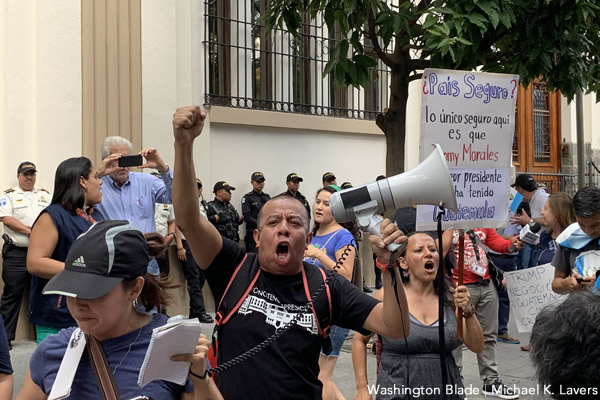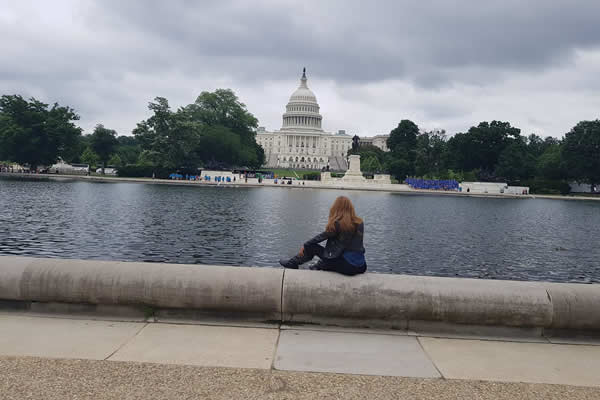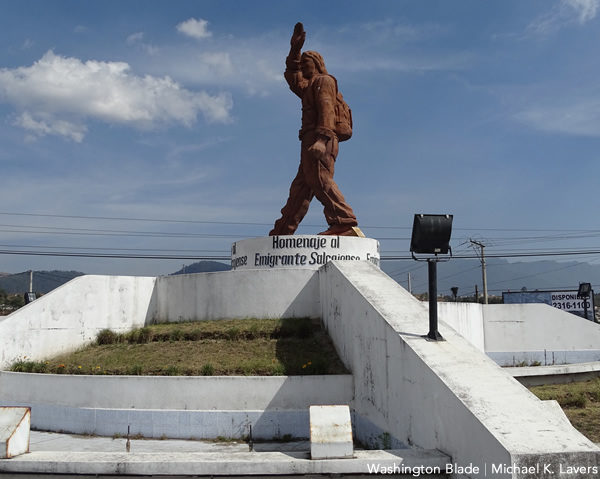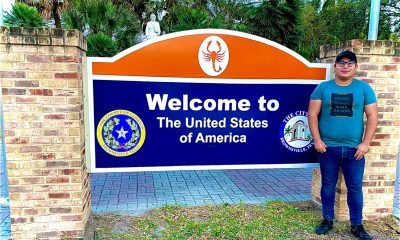World
Gay Guatemala congressman ‘scared’ for his life
Aldo Dávila a vocal critic of country’s president, corruption

GUATEMALA CITY — A gay Guatemalan congressman who is a vocal critic of his country’s president and corruption says he is afraid for his life.
“I am scared of what may happen with so much persecution against me,” Aldo Dávila told the Washington Blade on Sept. 10 during an interview at a Guatemala City hotel. “I am scared for my life, for my partner, for my family and for my team.”
Dávila — a member of the Winaq movement, a leftist party founded by Rigoberta Menchú, an indigenous human rights activist and Nobel Peace Prize winner — in 2019 became the first openly gay man elected to Guatemala’s congress. Dávila, who also lives with HIV, had previously been the executive director of Asociación Gente Positiva, a Guatemala City-based HIV/AIDS service organization.
Three men on April 19 approached his vehicle while it was stopped at a traffic light near Guatemala’s National Library and tried to rob him.
One of Dávila’s bodyguards who was driving shot one of the men. The other two men fled the scene before passersby and police officers arrived.
Dávila was not injured, but he later said in a Facebook post that he is “thankful for life.” Dávila told the Blade that Guatemalan authorities have not thoroughly investigated the attack.
“I requested an armored car after the attack, but I have not received it yet,” said Dávila, who arrived at the hotel with two female police officers who sat in the lobby while he spoke with the Blade. “This has not been resolved, even though it was in April. It is very complicated.”
Dávila said Culture Minister Felipe Aguilar, Congress President Allan Rodríguez and other supporters of President Alejandro Giammattei have lodged nine formal complaints against him after he publicly criticized the government over a variety of issues that include its response to the pandemic.
“It has been a systematic attack against me,” said Dávila.
Dávila told the Blade that he and his partner installed cameras in their apartment after someone killed their dog. Dávila also said he continues to receive death threats online and at his home.
“We are going to kill you, we are going to shut you up,” said Dávila, referring to the type of threats he says he receives.
“They send me little messages, I am clearly making those who are corrupt very uncomfortable,” added Dávila.
Prominent transgender activist murdered in June
Discrimination and violence based on sexual orientation and gender identity remains commonplace in Guatemala.
Dávila told the Blade that 21 LGBTQ people have been reported killed in Guatemala so far in 2021, including one person who was stoned to death.
Andrea González, executive director of Organización Trans Reinas de la Noche, a trans advocacy group, was shot to death in Guatemala City on June 11, days after Vice President Kamala Harris visited the country. The U.S. Embassy in Guatemala and U.S. Agency for International Development Administrator Samantha Power both condemned González’s murder, but Dávila told the Blade there has been “no investigation.”
“It’s one more case about which to forget, unfortunately,” said Dávila.
Dávila also noted he has met with officials who include representatives of the National Civil Police, the Public Ministry and the National Institute for Forensic Sciences “to ask what they are doing” to combat anti-LGBTQ violence in the country.
“This is serious,” he said.

‘People don’t migrate because they want to’
Menchú, Visibles Executive Director Daniel Villatoro and Ingrid Gamboa of the Association of Garifuna Women Living with HIV/AIDS are among the 18 members of Guatemalan civil society who participated in the roundtable with Harris while she was in the country. The U.S. vice president met with Giammattei before the event.
Harris has previously acknowledged that violence based on sexual orientation and gender identity is among the “root causes” of migration from Guatemala and other Central American countries. Harris and other Biden administration officials have also told migrants not to travel to the U.S.-Mexico border.
“People migrate because states don’t have the capacity to respond to the most basic needs,” said Dávila. “People don’t migrate because they want to. People don’t migrate because (they say) today I am going to go to the United States because I have nothing to do. They don’t go on vacation. They go in search of health, work, security and economic resources to be able to sustain themselves.”
“Guatemala has not had the capacity to retain Guatemalans because it doesn’t offer them the minimum to be able to live,” he added.
Dávila described Harris’ visit to Guatemala as “important.”
He said Guatemalans are “eternally grateful for the” COVID-19 vaccines the U.S. has donated to the country. Dávila added he would like Washington to “take a look at the human rights violations that are happening in” the country and further sanction those who are responsible for them.
Giammattei earlier this year named his chief of staff to Guatemala’s Constitutional Court.
The U.S. has granted asylum to former Attorney General Thelma Aldana, who the Constitutional Court refused to allow to run for president in 2019 after prosecutors alleged she embezzled money from a building purchase. The Biden administration in July stopped working with current Attorney General Consuelo Porras’ office after it fired Juan Francisco Sandoval, a leading anti-corruption prosecutor who subsequently fled the country.
The U.S. has imposed travel bans on a number of Guatemalan officials, but Dávila said these sanctions are not effective.
“We want clearer, more drastic sanctions,” he said. “The U.S. has been a historical ally for Guatemala, not just since yesterday, not from five years ago … it has been economically and financially supporting this country for a long time. The United States can impose more drastic sanctions against the government so the government stops being corrupt, so the government does not fight against migration.”

Dávila told the Blade he has not decided whether he will run for a second term in 2023.
Dávila said he has had “some problems” with the Winaq movement over funding for hospitals during the pandemic, but he remains a member. Dávila told the Blade he has received invitations to join other political parties.
“I am thinking about it and evaluating all the scenarios,” he said.
Dávila added he remains “very proud to be part of the opposition in the history of this country.”
Africa
For queer Nigerians, being on gay dating apps is still a risk
Homophobes target users for violence

Gay hookup apps like Grindr, and dating apps like Tinder and Bumble have managed to proliferate queer communities in countries like Nigeria.
Those who seek one night stands find what they want while those looking for love equally find what they seek. These platforms have managed to position themselves as safe spaces for queer people in anti-gay Nigeria. In recent times, however, it is proving to be unsafe, as homophobic people are quickly learning about the apps, and opening accounts that either seek to outrightly threaten queer people, or pretend to be queer, have long chats with gay people, invite them over, and inflict violence on them.
Take the case of Biodun, a queer Nigerian man who joined Grindr to meet up with guys like him.
After Biodun had built a connection and agreed to meet with someone whose display name was “Mamba,” they decided to meet up only for him to be met with violence. Apparently, Mamba ran a catfish account.
“I’ll never forget that day,” Biodun, who asked the Washington Blade not to use his last name because of safety concerns, said. “I still think about it, and sometimes blame myself for being very careless, even though Grindr was supposed to be our safe space.”
Biodun’s experience isn’t peculiar to him.
In Nigeria, draconian laws that criminalize same-sex relationships exist, making queer people turn to the digital realm to explore their identities and seek connections beyond the confines of societal oppression that comes with the physical environment. Gay dating apps such as Grindr, therefore, have emerged as virtual sanctuaries, offering spaces for queer Nigerians to forge friendships, find solidarity, and pursue romantic or sexual relationships. Spaces like this, however, have morphed into a landscape fraught with danger, as homophobic people have weaponized these platforms to perpetuate hate and violence.
“Sometimes, I often wonder how they learned about these platforms,” Daniel, which is not his real name, told the Blade. “You would think that it is just us in the platforms, until you find out that the accounts are rooted in homophobia.”
One time, someone’s bio read, “I’m only here to deal with the gay people. I know all of you, and I will find and kill you. We no want una for here (translates to we do not want you here, in English.)” It was a stark reminder that these spaces are no longer LGBTQ-friendly for Nigerians. In 2014, there was the passage of the Same-Sex Marriage Prohibition Act by former President Goodluck Jonathan, which not only criminalized same-sex unions, but also imposed severe penalties on anyone involved in LGBTQ advocacy or support.
This law catalyzed a surge in discrimination and violence against queer Nigerians; emboldening regular civilians, religious extremists, and even law enforcement agencies to target individuals perceived as deviating from traditional gender and sexual norms. Again, amid this hostile environment, gay dating apps emerged as lifelines for many queer Nigerians, offering avenues for discreet communication, community building, and the pursuit of intimate relationships.
The very anonymity and freedom these apps provided, however, became double-edged swords.
The advent of screenshot and screen-recording capabilities on these apps, for example, reduced the risks of exposure, strengthening the safety and privacy of users. However, this also comes with its own lapses, as queer people using Grindr have often relied on screenshots and screen recordings to confirm the identities of potentials with their friends, before accepting to meet.
“Before the removal of the screenshot option, I usually shared photos of others with my trusted friends,” Biodun shared. “But since that was taken off, there was no way for me to do that.”
Although, according to Grindr’s terms and conditions, the removal came with privacy concerns, as it was to facilitate a safe dating experience.
This erosion of digital safe spaces is depriving queer Nigerians of vital avenues for self-expression and affirmation,and is exacerbating the psychological toll of living in a society that continues to systematically demonize their identities. Moreover, the normalization of homophobic rhetoric and violence in both physical and digital realms has perpetuated a cycle of fear and oppression, and is reinforcing this notion that LGBTQ individuals are inherently unworthy of dignity and respect. Despite these challenges, though, the resilience of queer Nigerians continue to persist, as they defy societal norms and assert their right to love and be loved.

Dominica’s High Court of Justice on Monday struck down provisions of a law that criminalized consensual same-sex sexual relations.
A gay man who remains anonymous in 2019 challenged sections of the country’s Sexual Offenses Act that criminalized anal sex and “gross indecency” with up to 10 years and 12 years in prison respectively. The plaintiff argued the provisions violated his constitutional rights.
The Dominica Equality and Sexual Expression Association and the Eastern Caribbean Alliance for Diversity and Equality, a group that advocates for LGBTQ and intersex rights in the region, in a press release noted the court in its ruling affirmed “the criminalization of consensual same-sex activity between adults is unconstitutional.” The groups added Justice Kimberly Cenac-Phulgence “declared that the laws commonly known as buggery and gross indecency laws, contravenes the constitution of the Commonwealth of Dominica, namely the right to liberty, freedom of expression, and protection of personal privacy.”
“It is long past time that the dignity and dreams of all Dominicans were recognized,” said DESEA Executive Director Sylvester Jno Baptiste in the press release. “We are all God’s children, and he loves us all equally. Laws that treat some Dominicans as less than others, have no place in a just society.”
Dominica is a former British colony that is located between Guadeloupe and Martinique in the Lesser Antilles.
Antigua and Barbuda, St. Kitts and Nevis, Barbados, and Trinidad and Tobago in recent years have decriminalized consensual same-sex sexual relations.
The Inter-American Commission on Human Rights in 2021 issued a decision that said Jamaica must repeal its colonial-era sodomy law. The country’s Supreme Court last year ruled against a gay man who challenged it.
A judge on St. Vincent and the Grenadines’s top court in February dismissed two cases that challenged the country’s sodomy laws.
“Decriminalization helps create an environment where LGBTQ individuals can live openly without fear of persecution, enabling them to access health care, education, and employment without facing discrimination,” said Outright Executive Director Maria Sjödin on Monday in response to the Dominica ruling. “The repeal of these discriminatory laws is a testament to the tireless efforts of activists, advocates, and allies who have long fought for justice and equality. It is a victory for human rights and a significant milestone in the ongoing struggle for LGBTQ rights in the Caribbean.”
Africa
Upcoming Ugandan Census will not count intersex people
Advocacy group report documents rampant discrimination, marginalization

Uganda’s national Census next month will not count intersex people.
The revelation about the exclusion of intersex Ugandans in the 9-day Census exercise that will begin on May 10 has been confirmed to the Washington Blade by the head of Uganda’s Bureau of Statistics.
UBOS Executive Director Chris Mukiza in response to the Blade’s questions on the issue said the agency has “no business with intersex.”
Their counting could have made Uganda the second African country and the third globally after Australia and Kenya to collect an intersex person’s data in a Census.
Kenya’s 2019 Census determined there were more than 1,500 intersex people in the country.
Uganda had a population of 34.8 million, according to the country’s last Census that took place in 2014.
Intersex people in Uganda are among marginalized groups, subject to stigma and discrimination. The government has yet to recognize them as the third sex and consider them among other minority groups, such as people with disabilities, who enjoy special treatment.
Intersex people cannot be exclusively categorized as male or female for having a biological congenital condition with unique sex characteristics due to inherent and mixed anatomical, hormonal, gonadal, or chromosomal patterns that could be apparent before, at birth, in childhood, puberty, or adulthood.
Mukiza’s position of excluding intersex people in the Census, however, comes amid the prime minister’s office’s demands for inclusivity and equality for all the population. (The Constitutional Court on April 3 refused to “nullify the Anti-Homosexuality Act in its totality.”)
“We recognize that much work remains to be done particularly in addressing the needs of the marginalized and vulnerable communities, promoting inclusive economic growth, and combating climate change,” said Dunstan Balaba, the permanent secretary in the prime minister’s office.
Balaba spoke on April 18 during the National Population and Housing Census prayer breakfast meeting the UBOS convened. Religious leaders and other stakeholders attended it.
President Yoweri Museveni has noted that data from the country’s sixth national Census will be crucial towards achieving the nation’s Vision 2040 and help the government, non-governmental organizations, and donors in providing services to the diverse population.
“It will also provide the basis for planning the provision of social services such as education, health, and transport, among others at the national and local level,” Museveni said as he urged citizens to fully support the Census and provide accurate information.
Uganda has an intersex rights organization, “Support Initiative for People with Atypical Sex Development (SIPD),” which activist Julius Kaggwa founded in 2008 with the support of groups that advocate for children, women, and other marginalized populations.
Some of SIPD’s work as a non-profit, grassroots organization includes community outreach and engagement, sharing reliable information with the society for the protection of intersex people’s rights, and championing the need for organized medical and psychological support.
The organization, through its numerous reports, has decried human rights violations against intersex people that include surgery without consent, discrimination in homes, schools and medical centers, parents abandoning intersex children, and stigma due to lack of legal protection by the government.
Uganda’s Registration of Births and Deaths Act allows a parent or guardian of a child under the age of 21 to change the name or sex at the local registration office. The SIPD, however, maintains this law is discriminatory to intersex people over 21 who want to change their sex characteristics, and want parliament to repeal it.
The intersex rights organization wants the Health Ministry to establish a central registry to register intersex children after they’re born in order to receive support in terms of healthcare, social and legal by the government and other stakeholders as they grow up.
SIPD particularly wants the government to enact a policy that would allow a gender-neutral marker on birth certificates for intersex children to ease any change of sex in the future. The organization also wants the government, through the Education Ministry, to adopt a curriculum that also considers intersex issues in schools and creates a friendly environment for intersex children to learn and graduate like their non-intersex peers.
These demands follow SIPD’s findings that disclosed many intersex children were dropping out of school because of the stigma and discrimination they suffered. The organization has further called on the public-funded Uganda Human Rights Commission to live up to its constitutional mandates of defending human rights by leading the promotion and protection of the rights of intersex people across the country.
SIPD has also challenged religious leaders, who play a key role in Ugandan society and are influential at the local and national level, to promote acceptance of intersex people and to end discrimination against them.




















